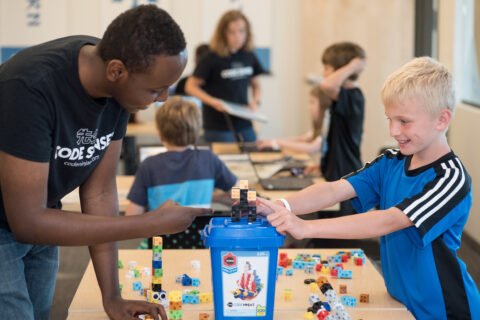OUTDOOR TREASURE QUEST
This action-packed adventure involves hiding treasures, creating precise instructions and following clear directions.
Coding concepts:
Decomposition
Sequencing
Algorithms
What they will need:
Treasure, paper and crayons or markers
Choose the treasure hider
Pick someone to be the top-secret treasure hider – the undercover
agent in charge of hiding a special treasure in the great outdoors.
The mission
The treasure hider’s mission is to draw a map with instructions that are easy to understand. These instructions are a sequence. Use lots of colours to make it super fun! Think of it as creating a secret code for the explorer. For example: Walk 10 steps like a giant. Turn right and take five big jumps or Dig down to find your hidden treasure! These steps are called decomposition.
Explorer’s adventure
Armed with their colourful map, the fearless explorer sets out on the
adventure – following each instruction step by step. These steps form
an algorithm.
Give hints and clues
If something seems tricky, the treasure hider can help explain or
show the way to ensure the explorer finds the hidden treasure
eventually.
Role reversal
After the adventure, it’s time to switch roles! Let everyone take
turns being the mastermind treasure hider or the fearless explorer –
ensuring everyone gets a chance to shine.
What do they learn?
Hunting for treasure is just like solving a puzzle. Think of the
instructions as a treasure map, telling your child exactly what to do
step by step. It’s rather like playing a game or learning a dance move –
they follow the rules to make everything work smoothly. Computers are
like that, too. They need clear and simple instructions, just like your
child needs good clues to discover the hidden treasure.
HOPSCOTCH RE-IMAGINED
Say goodbye to regular hopscotch! In this activity, the goal is to get through the hopscotch by following a sequence of directions.
Coding concepts:
Algorithms
Sequencing
What they will need:
Chalk and a pavement or driveway – be careful to avoid any cars!
Set the stage
Start simply by drawing a regular hopscotch board on the ground.
Number the boxes 1-10, or feel free to get creative with more or fewer
boxes. Create a large box next to your hopscotch board – this is where
the magic coding will happen!
Coder vs computer
Decide who is going to be the coder and who is going to be the
hopping computer. The coder’s mission is to guide the hopping computer
through the hopscotch board using arrows that will be written in the
box.
Start drawing your arrows
Get the coder to draw in the box a single arrow in the direction they
want their computer to hop. The goal? Keep the hopping computer on the
hopscotch board!
Introduce sequences
Challenge the coder to sequence multiple directions at the same time – creating a hopscotch algorithm. Each arrow is a step in the code that guides the computer’s hops.
Loop it up
Create a hopscotch algorithm that can be repeated, and have the
hopping computer perform the loop by following the sequence of
directions. This is the hopscotch loop. To make it even harder,
challenge the hopping computer to repeat the same hopscotch loop without
looking at the directions. That is the magic of loops – they make the
computer more efficient by allowing it to repeat steps without being
told each one individually.
What do they learn?
Hopscotch Reimagined enables your child to create a secret code while
playing. It involves planning moves step by step, like following a
recipe or game instructions. Drawing arrows is like giving special
instructions in coding, and loops make the computer more efficient, just
like repeating hopscotch moves without explaining each time. When
things get tricky, figuring out new ways to hop is like solving puzzles,
something coders do every day.
JEWELLERY CODING
This allows children to make their own colourful jewellery while also learning some cool coding concepts.
Coding concepts:
Functions
What you will need:
Multi-coloured beads and string.
Measure your knot
Cut a piece of string that can be wrapped around your wrist, once,
twice or three times. Tie a knot at one end of the string – that’s your
starting point.
Pick your pattern
Imagine your beads are secret codes! Choose a pattern of two beads
that you want to repeat over and over in your bracelet. Let’s call this
special set of beads a function. For example, maybe pink-blue is the magical code!
Thread your beads
Start threading those beads onto the string. After every three beads,
it is time to add your special function. In our example, that means
repeating the pink-blue sequence.
Repeat the magic
Keep going! Add three more beads, then bring in your function again.
Repeat this process until your string is long enough to wrap around your
wrist once, twice or even three times.
Tie a knot and display
Tie a knot at the other end of the string and admire your finished bracelet – a masterpiece of your very own code!
What do they learn?
With Jewellery Coding, your child is basically turning beads into
their own secret code. Choosing patterns for their bracelet is creating
special instructions, just like in coding. Threading beads is following
steps in a fun game and when they are done, their bracelet becomes a
unique piece of jewellery with its own special pattern.
Don’t forget that your child can encounter coding concepts through
everyday activities too. During their walks, suggest counting the number
of fir or oak trees – it is like unravelling a sequence code! Ask them
to count the number of red cars on your street. Challenge them to think
of things that follow sequences in everyday life and see how many they
can spot.
Remember, coding is not confined to the computer. It is hidden all
around us, transforming your child’s ordinary adventures into exciting
coding quests!
Visit Code Ninjas at www.codeninjas.co.uk for more coding adventures.













